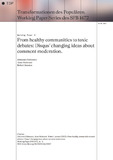Zitierlink:
http://dx.doi.org/10.25819/ubsi/10117Dateien zu dieser Ressource:
| Datei | Beschreibung | Größe | Format | |
|---|---|---|---|---|
| Passmann_Helmond_Jansma_comment moderation.pdf | 510.71 kB | Adobe PDF |  Öffnen/Anzeigen |
| Dokumentart: | Book | Titel: | From healthy communities to toxic debates: Disqus’ changing ideas about comment moderation | Sonstiger Titel: | Von gesunden Gemeinschaften zu toxischen Debatten: Disqus' wechselnde Ideen zur Moderation von Kommentaren | AutorInn(en): | Paßmann, Johannes Helmond, Anne Jansma, Robert |
Institut: | DFG-Sonderforschungsbereich 1472 "Transformationen des Populären" | Schlagwörter: | Disqus, Kommentarsysteme, Online-Kommentare, Moderation, Toxische Kommunikation, Web-Archive, Commenting systems, Online comments, Moderation, Toxic, Web archives | DDC-Sachgruppe: | 302.23 Medien (Kommunikationsmittel), Medienwissenschaft | GHBS-Notation: | KNZZ KNZT |
Erscheinungsjahr: | 2022 | Publikationsjahr: | 2022 | Serie: | Transformationen des Populären. Working Paper Series des SFB 1472 | Zusammenfassung: | This article examines how the commenting platform Disqus changed the way it speaks about commenting and moderation over time. To examine this evolving self-presentation, the Internet Archive Wayback Machine was used to analyse the company’s website and blog between 2007 and 2021. By combining interpretative close-reading approaches with computerised distant-reading procedures, it examined how Disqus tried to advance online discussion and dealt with moderation over time. It was found that in the mid-2000s, commenting systems were supposed to help filter and surface valuable contributions to public discourse, while ten years later their focus had shifted to the proclaimed goal of protecting public discourse from contamination with potentially harmful (“toxic”) communication. To achieve this, the company developed new tools and features to facilitate and semiautomate this active and interventive form of moderation. This rise of platform interventionism was fostered by a turn towards semantics of urgency in the company’s language to legitimise its actions. |
DOI: | http://dx.doi.org/10.25819/ubsi/10117 | URN: | urn:nbn:de:hbz:467-22064 | URI: | https://dspace.ub.uni-siegen.de/handle/ubsi/2206 |
| Enthalten in den Sammlungen: | Publikationen aus der Universität Siegen |
Diese Ressource ist urheberrechtlich geschützt. |
Seitenansichten
405
checked on 01.12.2024
Download(s)
454
checked on 01.12.2024
Google ScholarTM
Prüfe
Prüfe
Alle Ressourcen in diesem Repository sind urheberrechtlich geschützt, soweit nicht anderweitig angezeigt.

